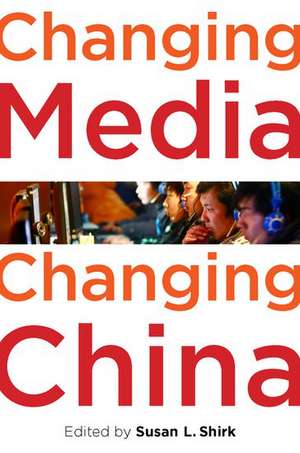Changing Media, Changing China
Editat de Susan L. Shirken Limba Engleză Paperback – 27 ian 2011
| Toate formatele și edițiile | Preț | Express |
|---|---|---|
| Paperback (1) | 163.62 lei 31-37 zile | |
| Oxford University Press – 27 ian 2011 | 163.62 lei 31-37 zile | |
| Hardback (1) | 401.54 lei 31-37 zile | |
| Oxford University Press – 10 feb 2011 | 401.54 lei 31-37 zile |
Preț: 163.62 lei
Preț vechi: 188.62 lei
-13% Nou
Puncte Express: 245
Preț estimativ în valută:
31.31€ • 32.81$ • 25.88£
31.31€ • 32.81$ • 25.88£
Carte tipărită la comandă
Livrare economică 01-07 aprilie
Preluare comenzi: 021 569.72.76
Specificații
ISBN-13: 9780199751976
ISBN-10: 0199751978
Pagini: 288
Ilustrații: 2 black white illustrations
Dimensiuni: 234 x 158 x 20 mm
Greutate: 0.39 kg
Editura: Oxford University Press
Colecția OUP USA
Locul publicării:New York, United States
ISBN-10: 0199751978
Pagini: 288
Ilustrații: 2 black white illustrations
Dimensiuni: 234 x 158 x 20 mm
Greutate: 0.39 kg
Editura: Oxford University Press
Colecția OUP USA
Locul publicării:New York, United States
Recenzii
The Chinese and foreign contributors to this book provide a nuanced, clear analysis of the fluid relationship among the Communist Party, the media, and the public.
Susan Shirk has been at the forefront of Western academics explaining the constant changes and contradictions inside China. This collection sheds very useful light on one of the most important and sometimes most contradictory of those changes: the evolution of the Chinese media as a tool for addressing the problems created by China's nonstop economic growth. This is a varied and stimulating range of views.
Contemporary China is best understood by those capable of embracing contradictions. Nowhere is this more necessary than in understanding Chinese media today. Some aspects of it are more open and flexible than ever; others have become even more rigidly controlled. In Changing Media, Changing China, Susan Shirk has gathered together a thoughtful array of essays that will help readers grasp the paradox of dynamic openness and retrograde Leninist control being played out across China in a truly fascinating manner.
In her edited volume Changing Media, Changing China Susan Shirk gives us a rich and in-depth panorama of the previously understudied realms of China's media policies. This book will be a real boon to the student of modern China.
Free from academic jargon and providing ample historical and institutional background information, the book is highly accessible as intelligent reading for those who are not China-watching specialists. Students of Chinese studies, particularly of the media, will find the multiple cases documented in the book a useful resource.
Susan Shirk has been at the forefront of Western academics explaining the constant changes and contradictions inside China. This collection sheds very useful light on one of the most important and sometimes most contradictory of those changes: the evolution of the Chinese media as a tool for addressing the problems created by China's nonstop economic growth. This is a varied and stimulating range of views.
Contemporary China is best understood by those capable of embracing contradictions. Nowhere is this more necessary than in understanding Chinese media today. Some aspects of it are more open and flexible than ever; others have become even more rigidly controlled. In Changing Media, Changing China, Susan Shirk has gathered together a thoughtful array of essays that will help readers grasp the paradox of dynamic openness and retrograde Leninist control being played out across China in a truly fascinating manner.
In her edited volume Changing Media, Changing China Susan Shirk gives us a rich and in-depth panorama of the previously understudied realms of China's media policies. This book will be a real boon to the student of modern China.
Free from academic jargon and providing ample historical and institutional background information, the book is highly accessible as intelligent reading for those who are not China-watching specialists. Students of Chinese studies, particularly of the media, will find the multiple cases documented in the book a useful resource.
Notă biografică
Susan L. Shirk is Director of the University of California's Institute on Global Conflict and Cooperation, and Professor at University of California, San Diego. A leading authority on China, she has written numerous books and articles on the subject, including China: Fragile Superpower and pieces that have appeared in the Washington Post, Financial Times, and Wall Street Journal.













